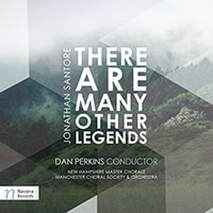Requiem: Learning to Fall
- For mezzo soprano, SATB chorus, and orchestra; secular text settings of poems by Peggy Johnson based on Philip Simmons’ Learning to Fall
- Length: 20:00
- Difficulty rating (1-5): 5

Listen to excerpts from the Navona Records release There Are Many Other Legends, tracks 18–29.
Performed by the Manchester Choral Society, conducted by Dan Perkins.
Emily Jaworski, mezzo soprano.
Performed by the Manchester Choral Society, conducted by Dan Perkins.
Emily Jaworski, mezzo soprano.
- View a PDF score excerpt
- Purchase, request full review copy or more information, etc.
- Rehearsal score (SATB/piano): $5 (for reproduction rights; minimum purchase of 10 required; additional charge for hard copies); full score: $30; set of parts: $30
Commissioned by the Yeoman’s Fund for the Arts in memory of Philip Simmons, and premiered by the Manchester Choral Society, Dan Perkins, Music Director
"Requiem: Learning to Fall" was commissioned by the Yeoman’s Fund for the Arts in Sandwich, NH, in honor of one of the fund’s co-founders, the writer and critic Philip Simmons. Phil and his family relocated to Sandwich, Phil’s boyhood summer home, in 1999, after Phil was diagnosed with ALS. The people of Sandwich formed a “circle of care” around them, providing daily assistance until Phil’s death. It was in the midst of this “circle of care” that Phil produced his masterwork, Learning to Fall: the Blessings of an Imperfect Life, which fellow author Scott Turow described as “A wonderful meditation on fallibility in a world of grace.”
His musical collaborator Peggy Johnson produced 12 vibrant poetic distillations of the 12 chapters in Phil’s book, and these served as the text for the Requiem. When Dan Perkins learned about the project, he offered to bring the work to the Manchester Choral Society, which was in the midst of a multi-year cycle of performing large works for chorus and orchestra, and MCS agreed to premiere the new work in Spring 2016. While this work shares some features with the traditional Requiem Mass, the text it’s based on is not about death—it’s about living right now, in this present moment. I think this was an issue that Phil considered throughout his life, and returned to during his final illness with deep forcefulness and clarity.
I.
And now, as I prepare to fall,
dear Lord, let me sing
Alleluia
let me pray
Alleluia
I fall to emerald water
Alleluia
let me fall with grace
Alleluia
I fall to grace
Alleluia.
Amen.
II.
Tigers either way, before me and behind me,
but here, on the ledge
tigers either way, above me and below me,
I hang, on the ledge,
tigers either way,
but here, on the ledge,
one perfect strawberry,
one perfect sweet berry,
I reach for the berry.
Amen.
III.
All winter beech leaves
remind us of what we have lost
semaphores of summer’s sun and green
All summer the greenly leaves
hide the mountains from our view
and brooks run up the trunks
Brooks run up the trunks of trees
to bring the greenly leaves
and light brings on the dark
In the fall we recall
what we are losing
and rejoice in it.
Alleluia.
IV.
Haul the wood, hammer the shingles,
work is your worship, building impermanence
Every moment is new, the past forgotten,
the coming only is sacred, energizing spirit.
Our lives, like houses, are never finished,
when they are settled, they are not alive,
Let us remain unsettled.
Let us truly live.
V.
Cultivating wildness takes practice,
direct deed,
aplomb in the midst of irrational things.
In life’s thicket – a clearing.
In the face of failure, loss, and death,
we lift our noses to the moon,
and sing.
VI.
Seek the holy quiet of solitude
Allow your self to be entered and filled
The life spirit you meet is also within you
Namaste
Let separateness fall away
Only do not give in to anger or hatred
Namaste
Announce your amorous intent,
Namaste
The collective call to love
VII.
In mud season
it is the rocks that
keep us up
We walk in mud,
the season
of our terrible
and certain
joy.
VIII.
As the tree puts forth new branches
through pores of old
so the world comes through you
The unfinished world is ours to develop
choose the world and fall to it
with presence and absence equally
From first breath to last,
as you move through the world,
the world moves through you
Choosing the world
we discover at the end
the world has already chosen us.
IX.
On the edge
of a moonlit field
good sledding
means darkness
and speed
danger
and no safety net
it is in falling
we find stillness
X.
Do not suffer change,
Dance, when you’re broken open.
Dance, if you’ve torn the bandage off.
Dance in the middle of the fighting.
Dance in your blood.
Dance, when you’re perfectly free.
XI.
Throw clay on the wheel
and center it so it spins
press the spinning lump
between your palms
thrust in your thumbs
pull the clay toward you
and as it forms
let go
only the clay can find the center
you cannot contrive to know
This is the rhythm of our lives
the striving and the pulling,
we are shaped by life, deformed
so we may return to form
We are thrown on the center of the wheel
our lives press in, thrusting thumbs intrude
one must let go all disaster and delight
and so return home, bearing gifts.
XII.
It is at the edge of night, of an idea,
or where I meets You, that the boundary
gives form to the thing,
where I know your skin is not mine,
and in touching the boundary we merge
where here and there become one
and now I throw my body and my self
into the sweet air I have breathed
and fall as all along
I am
learning
to fall
Alleluia.
—Peggy Johnson
“Requiem Poem,” by Peggy Johnson is based upon Learning to Fall by Philip Simmons, Copyright ©2000 by Philip Simmons, and used with the permission of the Estate of Philip Simmons.


